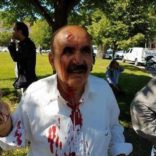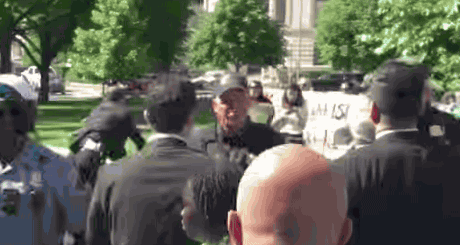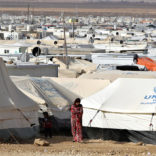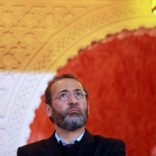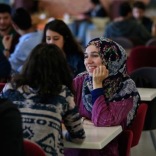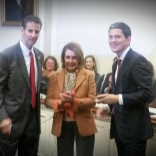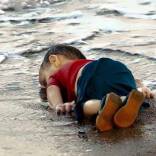In his recent book, “What You Don’t Know About Islam,” published in February, Oubrou calls for an “Islam of France,” which he defines as “the reconciliation of a spiritual Islam that expresses itself in the language of the Republican values already in place.” Namely, France’s holy triumvirate of liberty, equality and fraternity.
Largely for ideas like these, Oubrou has become a darling of the French political elite. In 2013, he was named a chevalier of the Legion of Honor, the country’s highest award for civil and military merit; in January 2015, he was chosen by the Interior Ministry as a special adviser to the government after the Charlie Hebdo attacks. There are even rumors that he could become a government minister if Bordeaux’s mayor, the popular Alain Juppé, wins the country’s presidential election next year.
But his ideas have also earned Oubrou many detractors, including a number of ordinary French Muslims, who feel that his views often parrot those of the government. After all, the same people who decorated Oubrou with the Legion of Honor ultimately condoned the burkini ban, on the grounds that it was an affront to republican equality.
Meanwhile, the Islamic State has issued several fatwas against Oubrou, whom its leaders regularly call the “imam of debauchery.” “He should be killed without hesitation,” insisted Dar al-Islam, its French-language magazine, in its spring issue. Oubrou says he has not lost any sleep over this latest threat — and still refuses the government’s offer of police protection. “If I were afraid, it would be a defeat,” he said.
To Oubrou, France has been since the French Revolution less of a country and more of a concept, committed to human rights and universal equality. And these, he argues, are the same lofty aspirations as those of Islam and any true religion.
“The Muslim faith is in the service of all humanity in general — as is the nation,” he said. “That’s what religion is: how to serve man, how to transform him, to make man as perfect as possible in thought, in sensibility, in spirituality, in relation to the mysteries of God.”
Born in Morocco to Francophone parents in 1959, Oubrou was naturalized as a French citizen in the late 1980s. It was a watershed moment in his life and his development as a thinker. As he put it: “I adopted French nationality, and so I should be loyal, quite simply. I should respect the law, contribute to the economy of this country and its prosperity as much as any other citizen.”
In France, as elsewhere in Europe, there is a long tradition of religions perceived as “foreign” working tirelessly to demonstrate that their teachings are more than compatible with society at large.
Throughout the 19th century, for instance, France’s Jewish leaders, facing constant anti-Semitism, argued that the Hebrew Bible stressed the same values as the nation. They proudly sent their sons and brothers to serve in the French military in World War I.
“Our third and fourth generations dream in French,” Oubrou said. “They should speak to God in French.”
Besides, he says, French citizenship is an identity distinct from other national affiliations: It is a “moral contract,” a commitment to lofty, abstract ideals that make more sense when individuals can connect them with their private faiths.
These days, what primarily interests Oubrou are those who feel excluded from that moral contract, especially the young French and Francophone Muslims who, for a variety of reasons, have been pushed toward radicalization in recent years. In each of France’s recent terrorist attacks, the perpetrators came from this loose demographic, a fact that Oubrou has begun confronting on a local level.
Along with Bordeaux’s City Hall, he has helped create a pilot program for “deradicalizing” young people suspected of showing violent tendencies at an early age. Called the Center of Action and Prevention Against the Radicalization of Individuals (CAPRI), it was formally launched announced in January.
According to Marik Fetouh, the Bordeaux municipal officer for equality and citizenship who oversees the program, CAPRI receives referrals from local authorities about individuals they suspect may be susceptible to radicalization: typically young men in relative social isolation whose social-media profiles suggest an affinity with the Islamic State or the rhetoric of other extremist groups.
Fetouh added that since the announcement of the program, local families — entirely independent of the authorities — have also begun approaching the organization about their children. They feel comfortable doing so, he said, because CAPRI is not meant as incarceration: It is primarily designed as a mental-health initiative, staffed with trained professionals who help troubled youths identify and confront the sources of their anger.Since it began, Fetouh said, CAPRI has worked with roughly 30 individuals. While a success rate will be difficult to ascertain, the hope is that the program will serve as a humane template for what other communities across France might do as the country confronts the issue collectively. This year, for instance, France’s prime minister, Manuel Valls, announced the establishment of other deradicalization centers, although those will focus on individuals at a later stage.
For Oubrou, a key factor in the fight against radicalization lies in acknowledging the shortcomings of the same nation he has devoted his life to upholding.
“To be honest, radicalization is a symptom of the malaise of the republic. Our notion of equality is never applied on the level of schools or on the level of work. Equality is important between women and men, and everyone must dress the same,” he said, referring to the rationale of those who opposed the burkini. “But not on the level of salary.”
This, in his mind, is the eternal riddle of the French Republic, at times as elusive and equivocal as the religions its staunch secularism nominally opposes. “France is perhaps the most utopian country in the world,” Oubrou said. “But it’s a utopia that’s not achievable.”

